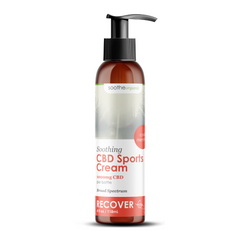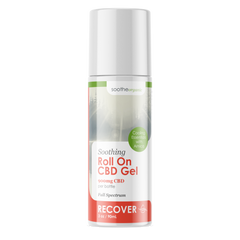Physical activity is essential for overall health, but muscle soreness is a common, unwelcome side effect. If you've ever pushed your body to its limits during a workout or athletic event, you know how uncomfortable and frustrating muscle pain can be. As such, it's natural that many people search for effective ways to ease their discomfort and speed up recovery.
One such solution gaining traction recently is cannabidiol (CBD), a non-intoxicating compound found in the hemp plant. But can CBD be the key to overcoming post-workout muscle soreness?
Read on to learn if incorporating CBD into your training regimen could be the answer to faster, more comprehensive recovery!
Key takeaways:
- CBD may help alleviate muscle soreness by modulating pain signals and reducing inflammation by interacting with the endocannabinoid system.
- CBD possesses potent anti-inflammatory properties, potentially addressing the root cause of muscle soreness.
- Preliminary research suggests CBD is a potential pain and inflammation management solution.
- Topical CBD products, such as lotions and balms, are popular and effective for targeting muscle soreness and promoting recovery.
- Systemic administration of CBD, such as edibles, may also be an option for muscle recovery support.
- Integrating CBD into your workout routine may be beneficial but be aware of possible trace amounts of THC in some products, especially for professional athletes subject to drug testing.
- Ideal CBD dosage for muscle recovery varies from person to person; start with a low dosage and gradually increase until the desired effects are reached.
- Consult with a healthcare professional before incorporating CBD into your routine, especially if you have underlying medical conditions or take medications.
Full Spectrum CBD and the Endocannabinoid System
To understand the link between CBD and muscle soreness, we must explore the endocannabinoid system (ECS). This complex cell-signaling network plays a crucial role in maintaining homeostasis within the body. The ECS comprises endocannabinoids, receptors, and enzymes that work together to regulate various physiological processes, including the ones vital for recovery (e.g., inflammation or pain perception).
CBD interacts with the ECS by binding to specific receptors, particularly CB1 and CB2. Through these interactions, CBD may help to alleviate muscle soreness by modulating pain signals and reducing inflammation.
The Anti-Inflammatory Power of CBD
While inflammation is the body's natural response to stress or injury, prolonged instances can lead to severe discomfort and delayed recovery times. Too much inflammation can even result in chronic conditions, such as arthritis.

CBD is believed to possess potent anti-inflammatory properties that can help manage muscle soreness by addressing its root cause. More specifically, CBD has been suggested to inhibit the production of pro-inflammatory cytokines by interacting with the inflammatory pathways. At the same time, CBD promotes the release of anti-inflammatory compounds like interleukin-10.
Research Insights
Although more research is needed to explore CBD's potential to promote muscle wellness, the available evidence points to promising results.
A 2020 study on 29 patients with symptomatic peripheral neuropathy suggested that the group that used topical CBD experienced a significant decrease in pain levels compared to those in the placebo group.
Interestingly, another study conducted in 2022 suggests that CBD doesn't reduce muscle soreness but makes the pain much less bothersome.
Such outcomes, although preliminary, clearly suggest that CBD has tremendous potential as a pain and inflammation management solution.
This sentiment seems further corroborated by a survey conducted in 2021 on a group of 253 participants. The study concluded that over two-thirds of 62% who tried CBD for pain-related issues reported a reduction in traditional analgesic usage.
Selecting the Right CBD Product For Muscle Support
Dealing with the problem of sore muscles and promoting healthy recovery with CBD can be done in various ways. The most popular method is the topical application of CBD-infused lotions, balms, or gels. This method is convenient, non-invasive, and effective at delivering CBD to the target area.
When using a product such as a CBD sports cream, the onset time is relatively quick - the CBD is absorbed transdermally through the skin and into the affected area, where it can interact with the ECS to manage pain and reduce inflammation.
If topical CBD products are not your tea, promote muscle recovery through systemic administration. This involves consuming any edible CBD product (e.g., gummies, capsules, etc.), which will then be digested and metabolized by the liver before entering the bloodstream.
How to Integrate CBD Into Your Recovery Routine?
While CBD products designed with muscle soreness in mind are predominantly used in post-workout recovery routines, nothing is stopping you from applying CBD before or even during your physical activity.
Using your chosen CBD product before the workout is sometimes preferable, as it may help you stay calm and focused during your training - a great boon if you're trying to push your limits during a particularly challenging session.
However, some CBD products might contain trace amounts of Delta-9 THC. While this is not enough to cause significant intoxicating effects, it is worth mentioning that WADA (World Anti-Doping Agency) prohibits the use of THC by professional athletes.

As such, if you are subject to drug testing, you should probably switch to a broad-spectrum CBD salve or a cream - these have no detectable levels of Delta-9 THC.
How Much CBD Should You Use to Support Muscle Recovery?
Unfortunately, there's no one-size-fits-all answer to this question. The ideal dosage of CBD for muscle soreness will vary from person to person and will also depend on factors such as body weight, the severity of discomfort, etc.
A good starting point would be to begin with a low dosage (e.g., 10-25 mg) and gradually increase it until you find the sweet spot. It is also important to keep in mind that topical CBD products might require a lower dosage than edibles since they are applied directly to the target area.
Conclusion
As you can see, CBD holds significant potential for addressing muscle soreness and promoting a more efficient recovery process. By interacting with the endocannabinoid system and exhibiting anti-inflammatory properties, CBD can help manage pain and inflammation associated with intense physical activity.
Experimenting with different CBD products and dosages can ultimately lead you to find the most suitable option that works for your individual needs. However, always consult with a healthcare professional before incorporating CBD into your routine, particularly if you are on any medications or have underlying medical conditions.
All in all, while more scientific effort is needed to fully understand the extent to which CBD can support muscle recovery, the current evidence suggests that it could be a promising natural alternative to more traditional solutions. So, why not give it a try and see if it can help make your muscle soreness more bearable?
CBD for gout, Organic sleep gummies, CBD mood swings, CBD sleep apnea, CBD stores casper wy, CBD, CBD casper wy broad spectrum cbd, full spectrum cbd , sleep gummies, cbd softgels, organic cbd salve, delta 9 gummies, best delta 9 gummies, thcv gummies, cbd gummies for anxiety, full spectrum vs broad spectrum CBD, broad spectrum CBD oil, USDA organic CBD, gummies for sleep, best CBD oil for pain, CBD softgels 25mg, best CBD oil for dogs, delta 9 gummies near me, CBD oil Wyoming, Wyoming CBD gummies, CBD energy drink, best sleep gummies, best THCv gummies, focus gummies, 1000mg CBD, 750mg gummies, muscle rub, CBD cream 1000mg, healing salve, vegan gummies, CBG tincture, Organic sleep gummies, CBD sleep apnea, strongest CBD gummies, gummies for sleep, best sleep gummies, sleep gummies for adults, nano CBD, nano CBD softgels, full spectrum CBD softgels, broad spectrum CBD softgels, green spectrum CBD gummies, CBD energy drinks, CBD mocktails, CBD for muscle recovery, CBD for better sleep, is CBD legal in Wyoming, best CBD Casper, CBD gummies Casper, THCv gummies Casper, CBD tinctures Wyoming, delta 9 gummies Wyoming, best CBD softgels Wyoming, CBD oil Casper Wyoming, Casper CBD store, CBD gummies Casper, CBD tinctures Casper, Hemp-derived CBD Casper, CBD products in Casper, Best CBD shop Casper, CBD capsules Casper Wyoming, Casper CBD hemp products, CBD for sale Casper, Wyoming Weed Laws, CBD Sports Cream, CBD Casper WY, CBD Cheyenne, Can you buy cbd oil in Wyoming, CBD Wyoming, thcv gummies effects, Best cbd for dogs, CBD Drinks, Buy cbd drinks online






